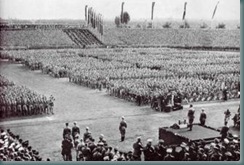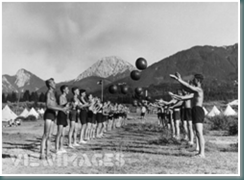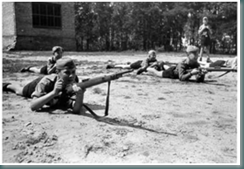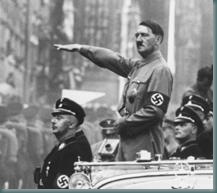World War II... One war we will not soon forget. The Holocaust, Pearl Harbor, the Atom Bomb, Iwo Jima, and the mass extermination of Jews were all atrocities this brutal war has left embedded in our minds. But now I think it is of utmost importance that another aspect of the war, the Hitler Youth, should be exposed to the public. What may not seem as severe as Auschwitz or Hiroshima, the Hitler Youth was, in fact, another one of Adolf Hitler's clever plans to turn innocent youth into monsters... Please take the time to read this and just think about those children...
The Hitler Youth
 The Nazi Regime was recognized as what could have been the worst time in world history. Endless killing, unnecessary deaths, living in fear; Nazi leader Adolf Hitler instilled fear in all who followed him, and all who dared to oppose him. His Nazi party slowly grew in size and power as they carefully domineered Germany and, eventually, the world. Hitler used tools at his aid including politics, the receding economy, and, most importantly, Germany’s youth. Adolf Hitler quickly found a method to manipulate the youth in Germany and train them to benefit the Nazi cause. Over the years, the Hitler Youth was born. Through rigorous training and disciplined lifestyles, weakness was hammered away as the fresh Hitler Youth members were transformed into brutal, fearless machines. The history of youth in Germany, the interactions of prior youth groups with the Nazi party and life in the Hitler Youth lead to a new regime in our world and a completely revolutionized definition of European youth. During World War II in struggling Germany, a monstrous youth was created before which the world would tremble.
The Nazi Regime was recognized as what could have been the worst time in world history. Endless killing, unnecessary deaths, living in fear; Nazi leader Adolf Hitler instilled fear in all who followed him, and all who dared to oppose him. His Nazi party slowly grew in size and power as they carefully domineered Germany and, eventually, the world. Hitler used tools at his aid including politics, the receding economy, and, most importantly, Germany’s youth. Adolf Hitler quickly found a method to manipulate the youth in Germany and train them to benefit the Nazi cause. Over the years, the Hitler Youth was born. Through rigorous training and disciplined lifestyles, weakness was hammered away as the fresh Hitler Youth members were transformed into brutal, fearless machines. The history of youth in Germany, the interactions of prior youth groups with the Nazi party and life in the Hitler Youth lead to a new regime in our world and a completely revolutionized definition of European youth. During World War II in struggling Germany, a monstrous youth was created before which the world would tremble.
Although Hitler Youth may have been the largest and most powerful Youth group in Germany history, its formation was preceded by several other youth groups for both boys and girls. Youth movement had always been a popular phenomenon in Germany in the 1900’s. Youth groups gave the helpless youth of Germany an opportunity to gain importance in community and serve a purpose in life. German youth assemblies became especially popular post World War I while Germany was suffering from an economic standstill. The sudden drop in living standards, due to the effects of the Treaty of Versailles, triggered a frustrated population with especially frustrated adolescents. Frustration from what exactly? Frustration from the lack of hope for a promising future in their beloved country of Germany. One of the earliest youth groups formed in the country was established in 1922 under the name “Hitler Jugend.” Due to the fact that this group was explicitly for young boys, its establishment was quickly followed by the formation of “Bund Deutscher Mädel,” or German League of Girls. Those who chose to join these youth leagues typically were of rebellious nature and solely valued youth control as opposed to the value their parents tried to pass down to them. The rebellious nature of several of these groups made its members all the more passionate towards the youth cause its league was working for. However, many youth joined groups like Hitler Jugend and Bund Deutscher Mädel simply for a time-passing leisurely activity. After school, students and parents alike were fond of the youth group concept because it provided a safe haven to keep children out of trouble. Of course, all of them remained oblivious of the concept’s potential until Hitler came into the picture and worked his magic.
Youth and political groups may have been great in numbers in Germany during the 1920’s, but none compared to the size and wrath of the Nazi Party. When leader Adolf Hitler slowly manipulated his way to the topmost seat in the German government, the Nazi party matured both in size and tactic rapidly. In this process, more and more teenagers were attracted to the political success of the Nazis and wanted to become a part of the Nazi revolution. Thereafter, the Nazi Youth League was founded in 1922. Regardless of the group’s name, the Nazi Youth League (henceforth the NYL) was not affiliated or officially labeled as the youth group of the Nazi party at the time. In fact, the NYL’s popularity was so scarce that a mere 17 youth showed up for the first official meeting in 1922. The NYL’s size grew very steadily for the next year until it finally had acquired sufficient attendance to potentially assist the Nazi party. At this point in time, the NYL was lead by a confident and witty man, Gustav Lenk. As the year of 1923 slowly settled upon Germany, the NYL devised its first major act of protest against the German government. On November 9th, 1923, three thousand NYL members accompanied by Nazi party radicals marched down the streets of Munich revolting proudly and confidently. They drummed, played their instruments, and broke out singing Nazi songs to impose terror upon the city. Immediately, the Munich police set up blockades and prevented the Nazis and youth from moving any farther. Their march may have been a failure in means of protest, but greatly benefitted the NYL when it came to publicity. After the Munich march, the German government banned the NYL. Outraged, Gustav Lenk founded a new league by the name of the “Patriotic Youth Association of Greater Germany.” This was still, essentially, a masked name for the Nazi Youth League. Flattered by the league’s determination and passion, the Nazi party quickly recognized the NYL’s efforts and named the NYL the official youth league of the Nazi Party  in April of 1929. With new inspiration, Adolf Hitler and his Nazi party quickly took advantage of the concept of youth involvement in the Nazi party and set up leadership schools around Germany. As the values, ethics, and opinions of the Nazi party were taught at this school, the Nazi Youth League (now official and more publicized that ever before) grew in size rapidly from its previous 3 thousand to a new record of about 80 thousand by 1932. Holding a new name, Hitler Youth, the NYL had achieved heights no other youth league had ever acquired before. With massive increase in numbers, renowned political success, and Nazi influence, the Nazi party was very near ready for warfare.
in April of 1929. With new inspiration, Adolf Hitler and his Nazi party quickly took advantage of the concept of youth involvement in the Nazi party and set up leadership schools around Germany. As the values, ethics, and opinions of the Nazi party were taught at this school, the Nazi Youth League (now official and more publicized that ever before) grew in size rapidly from its previous 3 thousand to a new record of about 80 thousand by 1932. Holding a new name, Hitler Youth, the NYL had achieved heights no other youth league had ever acquired before. With massive increase in numbers, renowned political success, and Nazi influence, the Nazi party was very near ready for warfare.
Subsequent to the rise in power of the Hitler Youth, the youth group’s functionality and basis of the league changed drastically as the Nazi Party (especially Hitler) saw the group’s true potential. In 1931, the Nazi Party tightened its grip on Hitler Youth to alter the group’s very purpose from youth involvement to serving the Fuhrer, Hitler. By the time the Hitler Youth had an attendance of 120,000 in 1933, the members of the group were discreetly being trained for warfare. Life in the Hitler Youth changed its participants from a body of power thirsty youth to a menagerie of blood thirsty killing machines. Of course, youth in the group had no idea of the Nazi’s intentions. All training was integrated into the children’s daily routines and brought across as “leisurely activities.” Uniforms in the Hitler Youth, for both boys and girls, consisted of a br own shirt and an armband swastika, similar to those worn by Hitler’s Storm Troopers and Nazi soldiers. In 1936, the government, now completely controlled by Nazis, passed a law making it compulsory for any child over the age of 10 to be a part of Hitler Youth. With new force, parents enrolled children in the Hitler Youth purely out of fear and to protect their children from the horrors of the outside world. Contrary to what parents wanted, children in the Hitler youth were slowly trained to become the ones causing these atrocities in the outside world. Daily, teens were kept busy through painstaking physical training. Activities for physical conditioning and keeping the youth in topmost physical condition included track, hiking, gymnastics, war games, and marksmanship. In the process of entertaining the youth with these pastimes, the Nazi party was slowly conditioning the boys and girls in Hitler Youth to be prepared for war. A storm was coming, and the Nazis were planning
and brought across as “leisurely activities.” Uniforms in the Hitler Youth, for both boys and girls, consisted of a br own shirt and an armband swastika, similar to those worn by Hitler’s Storm Troopers and Nazi soldiers. In 1936, the government, now completely controlled by Nazis, passed a law making it compulsory for any child over the age of 10 to be a part of Hitler Youth. With new force, parents enrolled children in the Hitler Youth purely out of fear and to protect their children from the horrors of the outside world. Contrary to what parents wanted, children in the Hitler youth were slowly trained to become the ones causing these atrocities in the outside world. Daily, teens were kept busy through painstaking physical training. Activities for physical conditioning and keeping the youth in topmost physical condition included track, hiking, gymnastics, war games, and marksmanship. In the process of entertaining the youth with these pastimes, the Nazi party was slowly conditioning the boys and girls in Hitler Youth to be prepared for war. A storm was coming, and the Nazis were planning to encounter it head-on. In a time of peril such as the 1930’s, German children in Hitler Youth accepted these toiling, laborious activities in exchange for benefits reserved solely for the youth of Hitler. For example, the members of Hitler Youth received extra food rations in comparison to prisoners and other Nazi soldiers. With nothing better to do, the Hitler Youth program provided a convenient pastime for many through activities that seemed pleasurable. But most importantly, those in the Hitler Youth received respect beyond that which any other Nazi received: they were hailed by Adolf Hitler, the Fuhrer, himself. Through all this, a previously calm and naïve youth body was converted into a fearless youth who demanded respect, instilled fear, never thought twice about killing, and were devoted to benefitting the Nazi cause regardless of the price. By brainwashing teens & children and captivating them through leadership and purpose, Adolf Hitler was ready for war in 1939 with a Hitler Youth program of 8.8 million youth standing proudly behind him. Cleverly, Hitler had created the Hitler Youth as a program to educate youth and then eventually use them as a well-trained army to further promote Nazi politics and ethics throughout the world.
to encounter it head-on. In a time of peril such as the 1930’s, German children in Hitler Youth accepted these toiling, laborious activities in exchange for benefits reserved solely for the youth of Hitler. For example, the members of Hitler Youth received extra food rations in comparison to prisoners and other Nazi soldiers. With nothing better to do, the Hitler Youth program provided a convenient pastime for many through activities that seemed pleasurable. But most importantly, those in the Hitler Youth received respect beyond that which any other Nazi received: they were hailed by Adolf Hitler, the Fuhrer, himself. Through all this, a previously calm and naïve youth body was converted into a fearless youth who demanded respect, instilled fear, never thought twice about killing, and were devoted to benefitting the Nazi cause regardless of the price. By brainwashing teens & children and captivating them through leadership and purpose, Adolf Hitler was ready for war in 1939 with a Hitler Youth program of 8.8 million youth standing proudly behind him. Cleverly, Hitler had created the Hitler Youth as a program to educate youth and then eventually use them as a well-trained army to further promote Nazi politics and ethics throughout the world.
The year of 1939 finally came and the Nazis were equipped for a brutal fight in their pursuit to conquer the world. With a mighty 8.8 million youth fighting beside their full grown men in the invasion of Poland, the initiation of World War II was most successful. Using early youth groups in Germany, taking advantage of youth relations with the Nazi party, and by creating a disciplined life in Hitler Youth, Adolf Hitler slowly and carefully built a foundation of able- bodied boys and girls, men and women to devote their lives to turning our peaceful world into a Nazi fearful world. Be it from fear, protection, or utter passion, what started as a dwindling youth group of 17 members slowly grew into what became the monstrous Hitler Youth: Hitler’s second army in war. Oblivious children were snatched from their families and childhoods to serve the Fuhrer and the “greater good.” Some were brainwashed, some overwhelmed with power; what used to be a young and ambitious youth generation fell victim to  the pressure of war and the thirst for power. To achieve what exactly? Forced murder, unthinkable atrocities, flowing rivers of blood, and a legacy of youth who helplessly did the unthinkable to demand reverence and leave their mark in what we now know as the Hitler Youth…
the pressure of war and the thirst for power. To achieve what exactly? Forced murder, unthinkable atrocities, flowing rivers of blood, and a legacy of youth who helplessly did the unthinkable to demand reverence and leave their mark in what we now know as the Hitler Youth…
